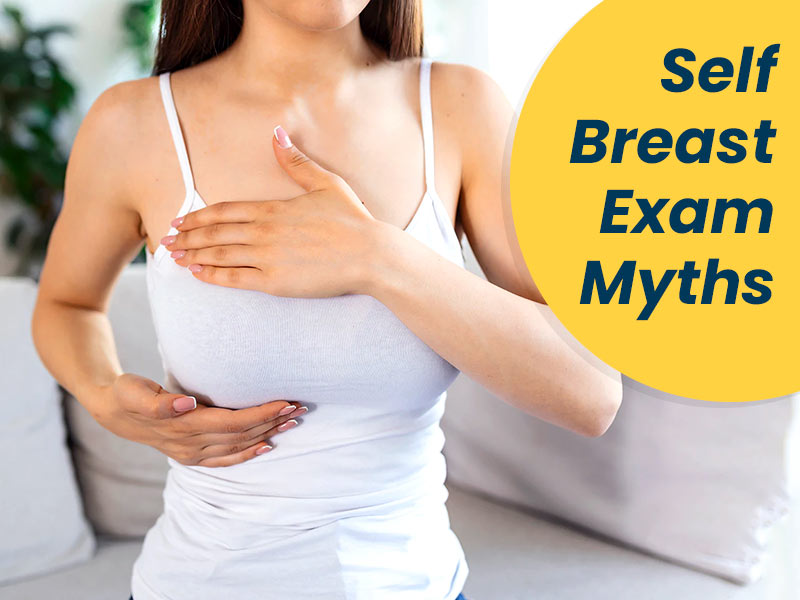
Breast cancer is the most prevalent cancer in India with over a million cases per year data. This is common in women but it is both preventable and treatable if diagnosed on time. Self breast examination is the first step towards breast cancer prevention as it helps in finding out possible symptoms of breast cancer through regular at-home screening. However, large-scale breast cancer self examination awareness has also given rise to myths among the masses. People have started to believe things that are medically unapproved. Through this article, Dr. Sandip Bipte, Consultant, Oncoplastic Breast Surgeon, Apollo Hospitals, Navi Mumbai busts some common self breast examination myths with facts.
Table of Content:-
Breast cancer is a malignant tumor arising in the cells of the breast. It is one of the most common cancers in India. As per a study conducted by International Agency for Research on Cancer, of all the cancer cases diagnosed in 2020, about 26.3 % of patients were diagnosed with breast cancer. Though it is more prevalent in women, men are also diagnosed with breast cancer, accounting for 1 to 2 % of all cases of breast cancer. In India, less than 1% of population opt for annual screening and over 50 to 60 % of women are diagnosed at stage 3 breast cancer. Hence, breast self-examination can be viewed as a crucial way to detect breast cancer at an early stage. In addition, World Health Organization (WHO) also recommends monthly breast self-examination as it aids in raising awareness among women about breast cancer.
Also Read: Breast Cancer In New Mothers- Signs To Look For While Breastfeeding
Breast Cancer Diagnosis
In general, mammography, clinical breast examination, and breast self-examination are the screening methods for early detection of breast cancer. Breast self-examination is recommended for women from early 20 years of age. It is a viable option available for rural areas in early detection of breast cancer.

Self Breast Examination procedure
A breast self-exam (BSE) is a screening technique to check for any lumps, thick spots, or changes in the breast.
- You can notice warning signs of breast cancer such as redness or rashes on the breast or nipple, changes in the size of the breast, inverted nipple, pain in the breast or armpit, nipple discharge, and dimpling of the breast skin.
- Breast self-examination is a convenient, no-cost, painless, safe, and non-invasive technique as it can be done at home on your own.
- It facilitates each woman to have a control over her health, provides knowledge of her breast condition, and most importantly, allows to detect cancer in early stage.
Due to a lack of awareness, several myths are surrounded about breast cancer, making it tough to diagnose and treat the disease. So, it is necessary to be educated about its facts to be well-informed.
MYTH: Breast self-examination prevents breast cancer

FACT: A large group of women think that doing self examination for breast cancer can prevent the disease. This is not true. Breast screening only helps detect the presence of breast cancer so that you stay alert and consult a doctor if you notice something unusual such as a lump on your breast(s). This examination is solely done to diagnose cancer at the initial stage.
Also Read: Fertility Precautions Women With Breast Cancer Should Consider
MYTH: Regular self-breast examination save lives.
FACT: Regular or monthly breast self-exam (BSE) can only help you to find a lump in earlier stages. It doesn’t guarantee to save lives. In fact, few studies suggest that routine or monthly BSE can induce anxiety in some patients leading to frequent doctor visits and unnecessary invasive procedures of benign breast lumps. However, it is a viable procedure for early detection in women residing in rural areas, as access to clinical breast examination or mammography is difficult.
MYTH: You can detect any lump with BSE

FACT: The main purpose of self breast examination is to identify cancerous lumps but that doesn't mean you can identify them all. As per doctor, all the breast lumps cannot be detected by BSE. It is sometimes harder to feel deeper lumps or lump in woman with dense breast tissue.
MYTH: BSE is recommended for every woman.
FACT: Most of the doctors recommend an annual health check-up rather than a monthly BSE, as we said earlier that it may cause anxiety in some women even when there are routine changes in the breast. In some cases, it may also instill a false sense of security. However, in some instances, breast self-examination also helps in early detection of breast cancer.
Factors associated with breast self-examination practice
Breast self-examination practice can be associated with factors such as marital status, family income, husband’s occupation, family history of breast cancer, medical history, barriers of breast self-examination (wrong perception or lack of knowledge, and fear of detecting breast cancer), higher health motivation, and self-efficacy in practicing breast self-examination.
Effective health education by creating awareness about the importance of breast self-examination is necessary. In addition, providing skills training and reminder for monthly self-examination can enhance breast self-examination practice.
Image credits- freepik
Also watch this video
How we keep this article up to date:
We work with experts and keep a close eye on the latest in health and wellness. Whenever there is a new research or helpful information, we update our articles with accurate and useful advice.
Current Version